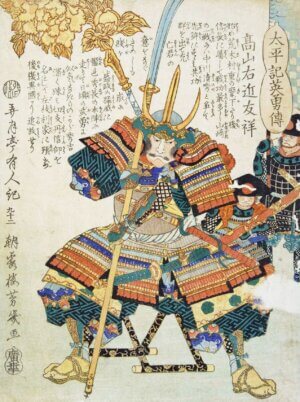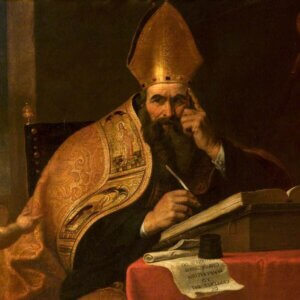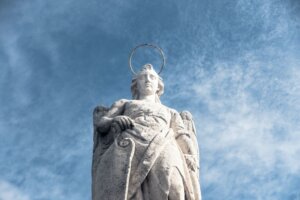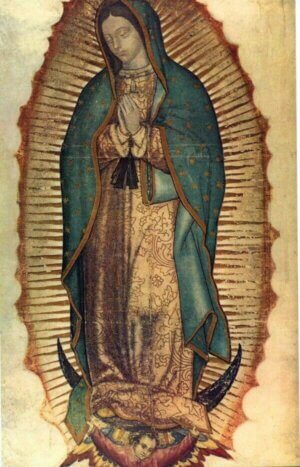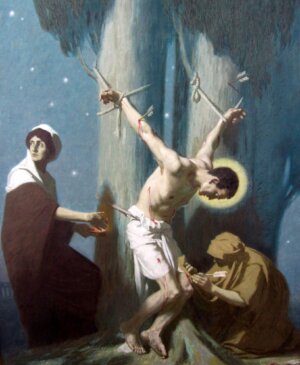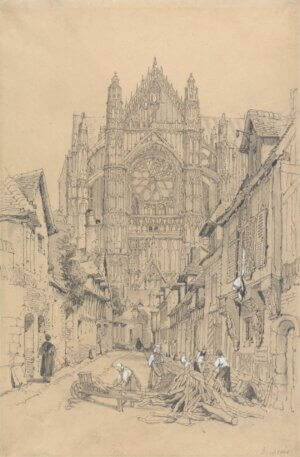You may think the words “saint” and “samurai” don’t go in the same sentence. The ancient warrior class of Japan—while enjoying legendary status for its skill and dedication—functioned within a pagan society and according to its ideals.
Right?
Let us introduce you to Blessed Justo Takayama Ukon, often called Dom Justo. Not only was he a devout Christian—he possibly lived out the ideals of the samurai better than anyone had before him.
The samurai were steadfastly dedicated to their code of honor. A major facet of this code was absolute devotion to one’s lord in the face of any trial or personal suffering—even to the sacrifice of one’s own life. Dom Justo had to make many difficult decisions throughout an illustrious career, and in every instance, he obeyed and honored his Lord above all—even when it eventually did cost him his life.
Takayama Hikogoro was born into a samurai family in 1552, just after the Jesuits had arrived in Japan. His father was the daimyo (lord) of a small castle. The family was well-respected and enjoyed connections with powerful lords and warriors.
Eventually the family became Catholic—converted by the eloquence of a half-blind wandering minstrel—when Hikogoro was eleven. Hikogoro took the name of Justo, after St. Justin Martyr.
Justo’s father retired from public life when Justo was twenty-one, entrusting the responsibilities of daimyo to the young samurai.
Holding various important positions during the ensuing years, Dom Justo was a great success as a warrior and leader—and also a model Christian. Though he had grown lukewarm in his Faith during his adolescence, his zeal was renewed as a young man, after which he strove to enable the spread of Christianity. Thousands were baptized due to his efforts, and he helped build a seminary. He himself advanced steadily to a high degree of prayer and virtue.
The lords under whom Dom Justo served were often friendly to his ambitions and allowed him to practice his faith and evangelize freely. But some were less so.
Things came to a head under the chancellor Hideyoshi, with whom Justo had an often-cordial relationship but who eventually forced him to choose between his faith and his service to Hideyoshi. Justo chose his faith. He lost his title, his territories, and his fortunes—but he kept his honor, for he knew where true honor lay.
Dom Justo then dedicated himself to spiritual and apostolic works. Hideyoshi did no further harm to him but maintained his anti-Christian attitudes; it was under him that the Twenty-Six Martyrs of Japan met their cruel end on February 5th, 1597.
After Hideyoshi’s death, Dom Justo enjoyed several years of peace, during which he was able to regain some of what he had lost and practice his faith without interference. But in 1614 the powerful Lord Ieyasu (who outranked Justo and his local, Christianity-friendly daimyo) expelled the Christian missionaries and their leaders, including Justo.
Dom Justo and his family went into exile in Manila and, forty days later, on February 3rd, 1615, the great Christian samurai died. Because his death was caused by the suffering he endured in exile, he was declared a martyr in 2016 and beatified the following year.
You don’t have to be a samurai to imitate Blessed Justo as a warrior of Christ. St. Paul in his letter to the Ephesians reminds us to “put on the full armor of God,” taking the helmet of salvation, the shield of faith, and the sword of the Spirit. Our Spiritual Armor Brass Plaque, inscribed with St. Paul’s exhortation, is an inspiring reminder of this calling. A great Confirmation or birthday gift for a boy or young man. Available today at The Catholic Company!
